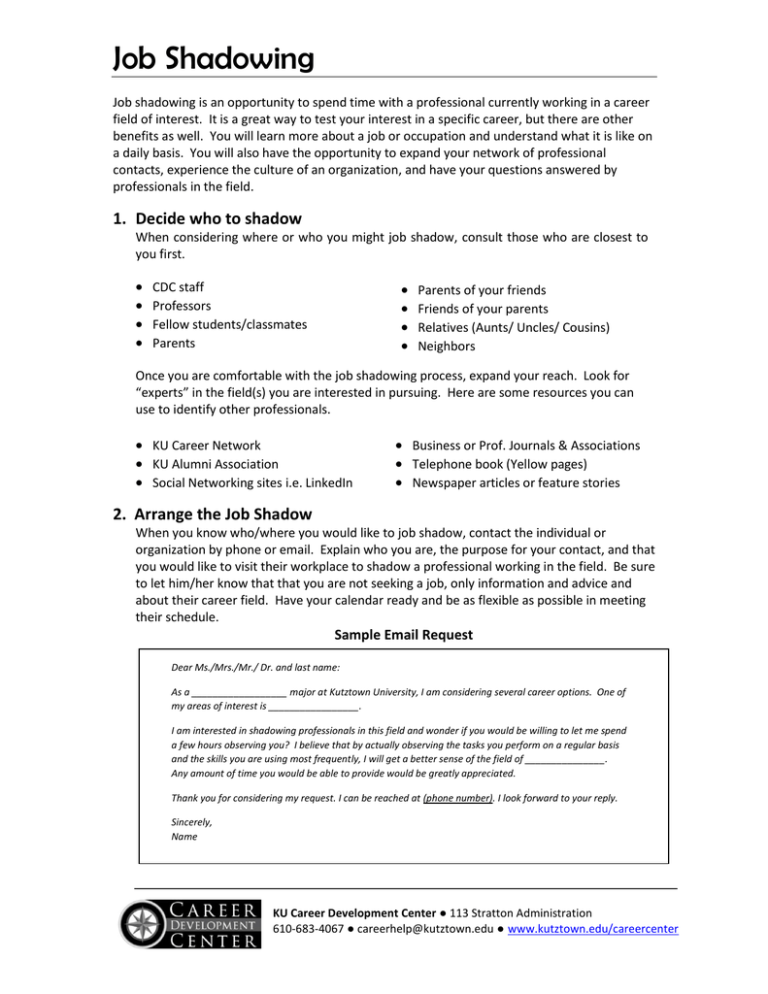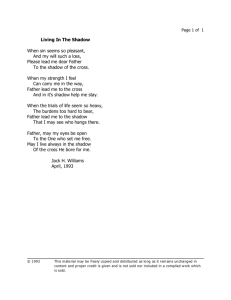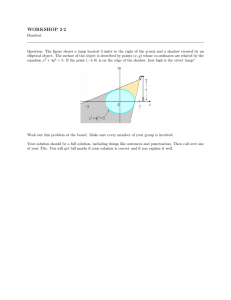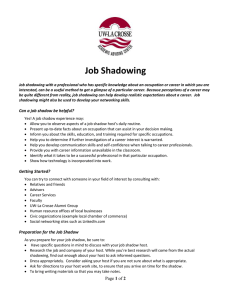Job Shadowing
advertisement

Job Shadowing Job shadowing is an opportunity to spend time with a professional currently working in a career field of interest. It is a great way to test your interest in a specific career, but there are other benefits as well. You will learn more about a job or occupation and understand what it is like on a daily basis. You will also have the opportunity to expand your network of professional contacts, experience the culture of an organization, and have your questions answered by professionals in the field. 1. Decide who to shadow When considering where or who you might job shadow, consult those who are closest to you first. CDC staff Professors Fellow students/classmates Parents Parents of your friends Friends of your parents Relatives (Aunts/ Uncles/ Cousins) Neighbors Once you are comfortable with the job shadowing process, expand your reach. Look for “experts” in the field(s) you are interested in pursuing. Here are some resources you can use to identify other professionals. KU Career Network KU Alumni Association Social Networking sites i.e. LinkedIn Business or Prof. Journals & Associations Telephone book (Yellow pages) Newspaper articles or feature stories 2. Arrange the Job Shadow When you know who/where you would like to job shadow, contact the individual or organization by phone or email. Explain who you are, the purpose for your contact, and that you would like to visit their workplace to shadow a professional working in the field. Be sure to let him/her know that that you are not seeking a job, only information and advice and about their career field. Have your calendar ready and be as flexible as possible in meeting their schedule. Sample Email Request Dear Ms./Mrs./Mr./ Dr. and last name: As a __________________ major at Kutztown University, I am considering several career options. One of my areas of interest is _________________. I am interested in shadowing professionals in this field and wonder if you would be willing to let me spend a few hours observing you? I believe that by actually observing the tasks you perform on a regular basis and the skills you are using most frequently, I will get a better sense of the field of _______________. Any amount of time you would be able to provide would be greatly appreciated. Thank you for considering my request. I can be reached at (phone number). I look forward to your reply. Sincerely, Name KU Career Development Center ● 113 Stratton Administration 610-683-4067 ● careerhelp@kutztown.edu ● www.kutztown.edu/careercenter 3. Prepare for the Job Shadow Look over literature on the company, its products and/or services. Become familiar with the company’s mission and history. Be prepared with a notebook and pen to take notes. Be reliable—map out your travel route and plan to arrive on time (about 10 minutes early). Arrive ready and prepared to learn. Plan your attire What is the dress code of the organization? If you are not able to obtain this information, err on the side of dressing a step above business casual until you determine the workplace climate. What you wear determines how others see you as well as how you see yourself. Think professional, yet comfortable. Practice good workplace etiquette Shake hands and introduce yourself to those you meet. Listen more than you talk. Observe the culture of the work and people. Ask questions when appropriate and take notes. Some questions you might ask: How did you first become interested in this field? How did you prepare yourself for the work that you do? What are the rewards and frustrations in your position/field? What advice would you give a student interested in pursuing this field? Ask for business cards for each employee you come into contact with that day. You will need this information later for thank you notes. Be respectful of the employer’s time, feelings, and thoughts. This is your chance to learn what skills and behaviors you’ll use throughout your career. Even if you decide this is not the career for you, take what you can from it: knowledge, exposure, and contacts. 4. Follow-up after the Job Shadow When you get home, jot down some notes about the experience that you can refer to later on. These may help you make some future decisions. ALWAYS send a thank you note to every person who met with you! If you are not sure of an employee’s name or title, call the office to find out. Sample Thank-you Note Date Dear Ms./Mrs./Mr./ Dr. and last name: Thank you for allowing me to come into your organization and observe your daily work routines. This opportunity has given me a more realistic view of this career field and has provided valuable insight into my future career plans. Thank you again for this opportunity. Sincerely, Signature Name Email and phone


